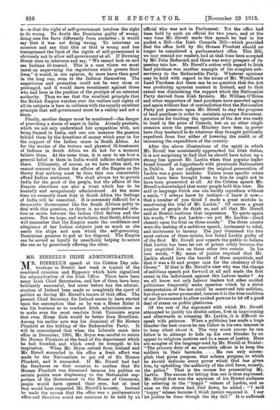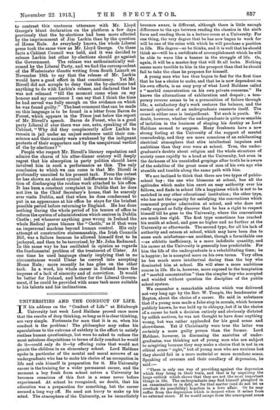MR. BIRRELL'S IRISH ADMINISTRATION.
R. BIRRELL'S speech at the Colston Day cele- brations in Bristol last week is typical of the combined cynicism and flippancy which have signalized his administration of the Irish Office. There have been many Irish Chief Secretaries, and few of them have been brilliantly successful, but never before has the admini- stration of Ireland been made so completely the sport of politics as during Mr. Birrell's tenure of that office. The present Chief Secretary for Ireland seems to have started upon the assumption that as he was a Home Ruler it was his business so to conduct Irish administration as to make even the most resolute Irish Unionists argue that even Home Rule would be better than Birrellism. Among his earlier acts was his dismissal of Sir Horace Plunkett at the bidding of the Redmondite Party. It will be remembered that when the Liberals came into office in December, 1905, Mr. Bryce was careful to retain Sir Horace Plunkett at the head of the department which he had founded, and which owed its strength to his inspiration. When Mr. Bryce retired from Ireland and Mr. Birrell succeeded to his office a fresh effort was made by the Nationalists to get rid of Sir Horace Plunkett, and it succeeded. If Mr. Birrell had had the frankness on that occasion to confess that Sir Horace Plunkett was dismissed because his politics on certain points were displeasing to the Nationalist sup- porters of the Government in the House of Commons, people would have opened their eyes, but at least they would have respected Mr. Birrell's honesty. Instead he made the excuse that the office was a parliamentary office and therefore could not continue to be held by an official who was not in Parliament. Yet the office had been held by such an official for two years, and at the very time Mr. Birrell made this speech be had in his pocket a Bill—the Irish Councils Bill—which provided that the office held by Sir, Horace Plunkett should no longer be considered a parliamentary office. This Bill, we may remind our readers, had at that time been accepted by Mr. John Redmond, and there was every prospect of its passing into law. Mr. Birrell's action with regard to Irish land purchase was another example of his complete sub- serviency to the Redmondite Party. Whatever opinions may be held with regard to the terms of Mr. Wyndham's Land Purchase Act there can be no question that the Act was producing agrarian content in Ireland, and to that extent was diminishing the support which the Nationalist Party derived from Irish farmers. Mr. William O'Brien and other supporters of land purchase have asserted again and again without fear of contradiction that the Nationalist Party put pressure upon Mr. Birrell to stay the progress of land purchase in order to maintain agrarian discontent. An excuse for limiting the operation of the Act was ready to hand in the price of Consols, but on no other single occasion since the present Ministry have been in power have they hesitated to do whatever they thought politically expedient from fear either of lowering the credit or of increasing the expenditure of the country.
After the above illustrations of the spirit in which Mr. Birrell has consistently approached his Irish duties, it is not surprising to find that he should have taken up a strong line against Mr. Larkin when that popular leader found himself at loggerheads with prominent Nationalists in Dublin. In our judgment the original prosecution of Larkin was a grave mistake. Unless some specific crime could have been brought home to him he ought not to have been prosecuted at all. At the Colston speech Mr. Birrell acknowledged that many people held this view. He said in language which one can hardly reproduce without a smile, "I always know by instinct—I know it now— that a number of you think I made a great mistake in sanctioning the trial of Mr. Larkin." Of course a great number of people do think so, and all that Mr. Birrell said at Bristol confirms that impression. To quote again his words, "We put Larkin—we put Mr. Larkin—(loud cheers) upon his trial on three counts." The three counts were the making of a seditious speech, incitement to rebel, and incitement to larceny. The jury dismissed the two most Eerious of these counts, but found Larkin guilty of of the first. Mr. Birrell now expects the public to believe that Larkin has been let out of prison solely because the jury acquitted him on these other two counts. In his own words, "My sense of justice required that Mr. Larkin should have the benefit of these acquittals, and that it was a fit and proper case for the clemency of the Crown." If that is Mr. Birrell's view why was the charge of seditious speech put forward at all and made the first count in the indictment against this Labour leader ? As we all know, not only Labour leaders but other excited politicians frequently make speeches which by a strict interpretation of the law could be construed into sedition, but they are never prosecuted, because it is the wise tradition of our Government to allow excited persons to let off a good deal of steam on public platforms. Of the rest of the argument with which Mr. Birrell attempted to justify his double action, first in imprisoning and afterwards in releasing Mr. Larkin, it is difficult to speak with patience. When a politician has made a. huge blunder the best course he can follow in his own interest is to keep silent about it. The very worst course he can follow is to attempt to hide up his own blunder by an appeal to religious motives and to a sense of justice. Here are samples of the language used by Mr. Birrell at Bristol: "The primary duty of an executive officer is to keep the soldiers in their barracks. . . . He can only accom- plish that pious purpose, that solemn purpose, to which he should dedicate every power which God has given him, by upholding the authority of the civil force, namely, the police." That is the excuse for prosecuting Mr. Larkin. The excuse for letting him out is thus expressed. Mr. Birrell first won the applause of his Bristol audience by referring to the " happy " release of Larkin, and as soon as the cheers had died down, he added : "I said ' happy ' release because I think justice required it.. I say let justice be done though the sky fall." It is sufficient to contrast this unctuous utterance with Mr. Lloyd George's blunt declaration on the platform a few days previously that the by-elections had been more affected by the imprisonment of Jim Larkin than by the question of Home Rule. As everybody knows, the whole Liberal press took the same view as Mr. Lloyd George. On these facts a Cabinet Council was held, and it was decided to release Larkin lest other by-elections should go against the Government. The release was enthusiastically wel- comed by the Liberal Party, and we find the correspondent of the Westminster Gazette writing from South Lanark on November 18th to say that the release of Mr. Larkin would have a good effect in that constituency. Yet Mr. Birrell did not scruple to deny that the by-elections had anything to do with Larkin's release, and declared that he was not released "till the moment came when on my honour and my conscience I can say that I think the time he had served was fully enough on the evidence on which he was found guilty." The best comment that can be made on this language is to be found in a letter from Baron de Forest, which appears in the Times just below the report of Mr. Birrell's speech. Baron de Forest, who is a good party Liberal if ever there was one, asks, speaking of the Cabinet, "Why did they complacently allow Larkin to remain in jail under an unjust sentence until their con- science and their anxiety were awakened by the indignant protests of their supporters and by the unequivocal verdict of the by-elections ? "
People who respect Mr. Birrell's literary reputation and admire the charm of his after-dinner oratory will deeply regret that his absorption in party politics should have involved him in such a performance as this. The only conclusion to which we can come is that Mr. Birrell is profoundly unsuited to his present task. From the outset he has shown an almost cynical indifference to the obliga- tion of discharging the routine work attached to his office. It has been a constant complaint in Dublin that he does not live in the Chief Secretary's house, that he scarcely ever visits Dublin, and that when he does condescend to put in an appearance at his office he stays for the briefest possible period before returning to England. He has done nothing during the whole period of his tenure of office to reform the system of administration which centres in Dublin Castle ; yet whenever anything goes wrong in Ireland the whole Radical press blames the "Castle," as if that were an impersonal machine beyond human control. His only attempt at constructive statesmanship, the Irish Councils Bill, was a failure because he allowed himself first to be jockeyed, and then to be terrorized, by Mr. John Redmond. In the same way he has oscillated in opinion as regards the fundamental problem of the treatment of Ulster. At one time he used language clearly implying that in no circumstances would Ulster be coerced into accepting Home Rule ; more recently he has gone on the other tack. In a. word, his whole career in Ireland bears the impress of a. lack of sincerity and of conviction. It would be better for Ireland, and better for the Liberal Govern- ment, if he could be provided with some task more suitable to his talents and his inclinations.



















































 Previous page
Previous page